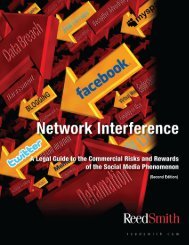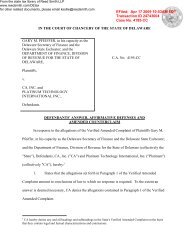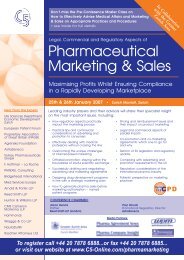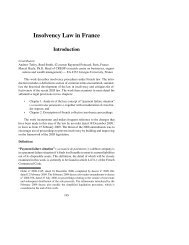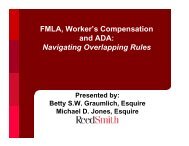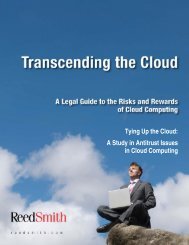Banking Industry Regulatory Update - Reed Smith
Banking Industry Regulatory Update - Reed Smith
Banking Industry Regulatory Update - Reed Smith
- No tags were found...
You also want an ePaper? Increase the reach of your titles
YUMPU automatically turns print PDFs into web optimized ePapers that Google loves.
<strong>Banking</strong> <strong>Industry</strong> <strong>Regulatory</strong> <strong>Update</strong>INTRODUCTIONIn light of the economic turmoil and loss of consumer confidence which has blighted the UK andinternational financial system over the past two years, the Tripartite Authorities have sought to reformthe UK banking industry by strengthening the financial system’s stability and resilience. The TripartiteAuthorities have also been working alongside their European and international counterparts to createa more stable and transparent system.This update sets out those key UK, European and international reforms, and proposals for reform.This update sets out the position as at late August 2009 but this is an ever changing regulatoryenvironment. Care should be taken when using the update as it will become out of date relativelyquickly.CORPORATE GOVERNANCEWalker reviewThe Walker review on corporate governance, published on 16 July, has set out 39 recommendationswhich are intended to improve the governance of UK banks and other financial institutions.The review has called for “an environment in which effective challenge of the executive is expectedand achieved in the boardroom before decisions are taken on major risk and strategic issues” and hasearmarked non-executive directors (“NEDs”) to play a more significant role in risk management.Among its recommendations to increase the effectiveness of NEDs, the review has proposedproviding NEDs with a personalised approach to induction, training and development, and has statedthat NEDs should be expected to commit themselves for a minimum of 30 to 36 days in a major bankboard. Chairmen should be expected to commit not less than two-thirds of their time to the businessof the entity. The Financial Services Authority’s (“FSA”) interview process for NEDs should involvequestioning and assessment by one or more senior advisers with relevant industry experience.The role of institutional shareholders will be enhanced through encouraging adherence to principles ofbest practice and by giving weight to these ‘Principles of Stewardship’ through their ratification by theFinancial Reporting Council. Authorised institutional investors should describe their policies onengagement and how they seek to discharge their responsibilities that commitment to the Principlesentails on their websites.The boards of banks and other financial institutions should establish a board risk committee, servedby an independent Chief Risk Officer, with responsibility for oversight and advice to the board on thecurrent risk exposures of the entity and future risk strategy. A board risk report should be included asa separate report within the annual report and accounts.The review also stresses the need for substantial enhancement in board level oversight inremuneration policies. One of the most notable recommendations is that at least one-half of variableremuneration is offered in the form of a long-term incentive scheme in which half of the award vestsafter not less than three years and the remainder after five years. The review also states that shorttermbonus awards should be paid over a three year period with not more than one-third in the firstyear. The FSA published its much-anticipated final code of practice on remuneration in August. Moreinformation is provided on the FSA’s remuneration code below.The consultation period will run until 1 October, with conclusions in November 2009.



